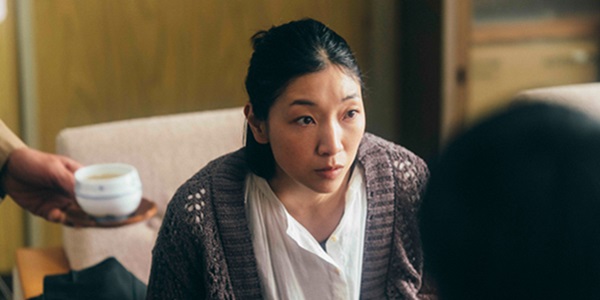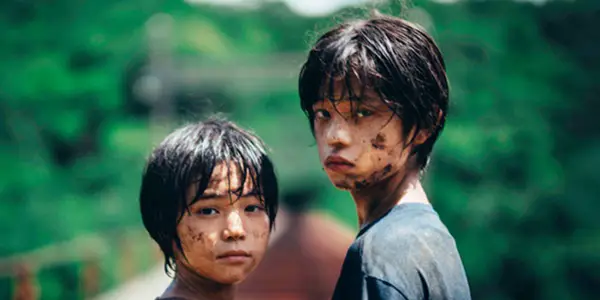MONSTER: The Truth About Youth

Lee Jutton has directed short films starring a killer toaster,…
One of our most compassionate cinematic storytellers turns his camera on the complicated relationship between two young boys—a relationship that none of the adults in their lives seem capable of understanding—in Monster, the latest film from director Hirokazu Kore-eda (Shoplifters, Broker). Working from a sensitive script by Yuji Sakamoto that won Best Screenplay at the 2023 Cannes Film Festival, Kore-eda weaves a complex, Rashomon-style tapestry of a tale, one in which affection is mistaken for bullying, support is mistaken for abuse, and lies—the ones we tell others and the ones we tell ourselves—are repeatedly mistaken for truth.
Missing Pieces
Monster tells us the same tale three times over from three different characters’ viewpoints, each time gradually peeling more and more of the wool from our eyes so that we can slowly absorb the heartwrenching truth. First, we are presented with the perspective of single mother Saori (Sakura Andō, who previously appeared in Kore-eda’s Shoplifters and won the Best Actress Japan Academy Film Prize for her role here). Saori has started noticing worrying behavior from her fifth-grader son, Minato (incredible newcomer Sōya Kurokawa), including coming home from school with strange injuries, coming home with only one shoe, and even not coming home at all.

Saori suspects that Minato’s teacher, Mr. Hori (Eita Nagayama), is abusing him; however, when she confronts the school with her concerns, they reply with bland, generic excuses that are clearly designed to protect the reputation of the school more than her son. When she learns that her son has been accused of bullying a classmate named Yori Hoshikawa (Hinata Hiiragi), Saori decides to dig deeper…but her encounter with Yori, a sweet and unusual boy who seems to genuinely like Minato, only confuses her more.
Time winds backward to show us the same series of events from the perspective of Mr. Hori, a kindly man whose actions, while occasionally misguided, have been repeatedly misinterpreted by others as something more sinister. Yet so much of the relationship between Minato and Yori, and the strangeness of their behavior, still remains a mystery to the audience until we finally see the story told from the perspective of Minato himself. Considering that the film won the Queer Palm at Cannes, you can guess at the nature of their secret, but even then, Monster continues to serve up surprises, culminating in a beautifully ambiguous ending that will make your heart soar even as it’s also in danger of shattering.
Fly Free
Monster succeeds in large part because despite its complexity, it is never confusing; each new perspective serves to clear away more and more of the clutter until the truth finally emerges, like a delicate butterfly slowly spreading its wings and exiting its cocoon. Indeed, much like a caterpillar undergoing the inherently vulnerable process of metamorphosis, Minato has wrapped himself in a protective casing of misleading statements and outright lies to keep himself from being hurt. It’s only through a chance encounter with the school principal (Yūko Tanaka), whose conscience is tormented by a secret of her own, that he realizes he is better off embracing the true nature of his relationship with Yori than trying to hide it from himself and others; it is only through honesty that he can fully regain his humanity and stop viewing himself as some kind of monster. “If only some people can have it, that’s not happiness,” the principal tells him, adding, “Happiness is something anyone can have.” Even if Kore-eda did not write the film’s script, it’s hard to think of a line that more perfectly sums up his perspective as a filmmaker.

Kore-eda has always been a master of working with ensemble casts, and Monster is a wonderful continuation of that. From Andō‘s spirited portrayal of a single mother determined to prove she can do what is right for her son, to Tanaka’s tragic embodiment of a woman nostalgic for a time when she wasn’t tortured by her life choices, to Nagayama’s likable yet unfortunately naive young schoolteacher, all of the adults are doing career-best work, which is no inconsiderable feat when one considers the careers involved. (It’s worth noting that in addition to winning Best Actress, Andō also won the Best Supporting Actress Japan Academy Film Prize this year for her role in Godzilla Minus One—she is having a well-deserved moment.) But it’s the kids who truly impress; Hiiragi’s Yori is a ray of sunshine despite being constantly bullied by other kids for being perceived as effeminate, while Kurokawa’s Minato perfectly personifies the confusion and exhilaration of youth on the cusp of change, especially in the way he wrestles with his increasingly romantic affection for Yori.
The atmosphere of Monster is one charged with tension and emotion, emphasized by music contributed by legendary composer Ryuichi Sakamoto prior to his death from cancer in March of last year. When the final piano theme—an elegant, elegiac melody—kicks in during the film’s climactic moments, it’s impossible to not feel your eyes welling up, both at the beauty of the sequence and at everything we’ve lost with Sakamoto’s passing. Monster is dedicated to his memory, and it’s a fitting tribute to his very special talents.
Conclusion
One of the most painfully lovely films of last year, Monster is a moving reminder of the importance of empathy and understanding that could only come from Hirokazu Kore-eda.
Monster is available on digital and will be released on Blu-ray by Well Go USA Entertainment on April 9, 2024.
Does content like this matter to you?
Become a Member and support film journalism. Unlock access to all of Film Inquiry`s great articles. Join a community of like-minded readers who are passionate about cinema - get access to our private members Network, give back to independent filmmakers, and more.
Lee Jutton has directed short films starring a killer toaster, a killer Christmas tree, and a not-killer leopard. Her writing has appeared in publications such as Film School Rejects, Bitch: A Feminist Response to Pop Culture, Bitch Flicks, TV Fanatic, and Just Press Play. When not watching, making, or writing about films, she can usually be found on Twitter obsessing over soccer, BTS, and her cat.











